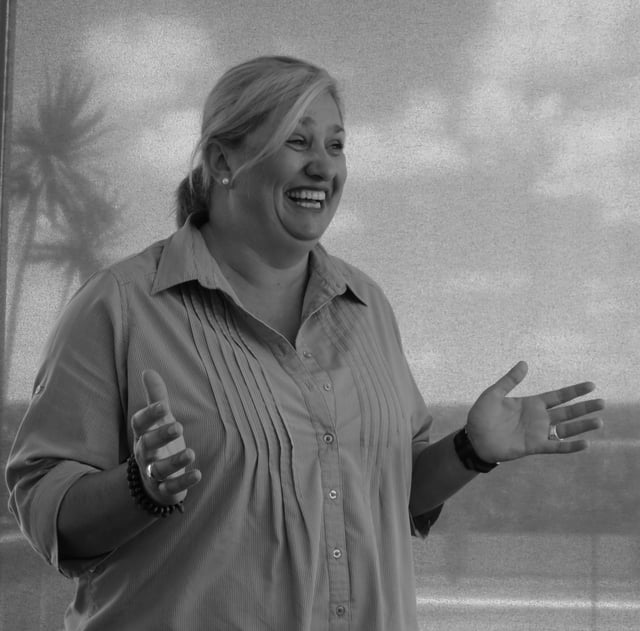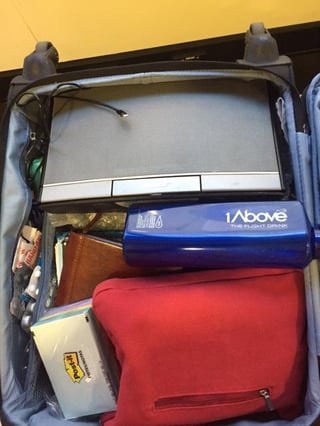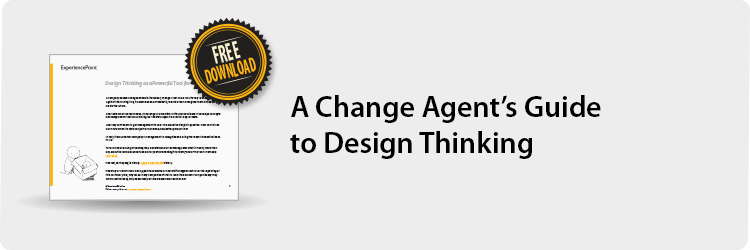(5 min read)
We recently sat down with Kerryn Ross for a lively and candid conversation that took us from the “ahas” of true collaboration to the many virtues of wearing black at important facilitation gigs. We are lucky to have Kerryn in our network and to have her insights to share with others in our network. And we know who to call the next time we have a headache.

Name: Kerryn Ross
Home: Sydney, Australia
Organization: Phuel
Number of Experiences: Over 1,900 ExperienceInnovation and ExperienceChange...and counting!
Email: kerryn@phuel.com
Why is teaching others how to innovate and lead change important for you?
I don’t know about you but I am so bored with the default way of doing things that we see so often in business. I am excited about this shift in the way people work. I get excited about showing people how to really collaborate. Having generative conversations with a bias towards action.
Most people already think they do high-performance collaboration. Recently, I did leadership course for senior general managers at a big telco, and there were so many varying views as to what collaboration is.
When you actually show people how to do collaborative problem-solving, define their challenge or have ideation sessions, and it’s true collaboration, with everyone on their feet, involved and highly engaged, the outcome is so much stronger. They say, “Wow, I actually never realized what collaboration was until we just did that!”
I know Simon Sinek says always start with the why. I am finding more and more that when you show people the HOW to do something, the what and the why answer themselves.
You’re at the forefront of innovation and change. Is there a particularly powerful facilitation experience you could share with us that really encompasses that?
Recently, I worked with the People and Culture team of a really big gaming company. I ran the ExperienceInnovation simulation followed by defining their challenge. After loving the simulation they were inspired to want to use design thinking to create a better employee experience. Something that is becoming more commonplace.
I’ve done a lot of reading in this area—Deloitte just published a paper on it—and it seems to be really coming to the fore.
I then ran a design thinking SPRINT with them and it was awesome. While they brought a lot of data from engagement surveys, when I got them to go and identify some extreme users and identify experts—gee, that was powerful. And it was a really hard conversation to get them out of their default thinking and realize that, just because you’re talking to employees all day long because it’s your job, you’re not actually looking for the things and the insights that we captured on the day.
It was an amazing series of days. To see the insights that they developed from interviewing extreme users. That was powerful.
If you could wake up tomorrow having gained any one quality or ability, what would it be and why?
If I could wake up tomorrow with a “superpower” it would be the ability to re-design the future of work to be intrinsically motivating. We see so many businesses dreaming up mission and purpose statement and values when HBR research tells us the thing that motivates people at work is meaningful progress.
That is what I love about the new 2-day Apply program by EP. It creates meaningful progress in a rapid design thinking cycle. That is meaningful progress and quickly.
If you could work alongside someone for a day, who would that be and why?
This is an easy one for me because it’s recent and it’s thanks to ExperiencePoint: Tim Brown. I was really impressed when he sat down and chatted with us in San Francisco. I could see this massive brain the size of a planet, and I was really impressed.
I think he is a rare thinker. How cool is it that he’s been able to get to a stage in his life and career where he gets to focus on the big social topics. He was talking about the fundamental stuff that gets him excited these days. They’re the things that haven’t changed since the Industrial revolution—our tax systems, educational systems, health systems—all of the things that every society is talking about.
I walked away thinking, what a treat to have met him. I’d love to be his shadow for the day.
What do you love most about your role and being a facilitator?
When you’re talking about change and innovation, you’re at the forefront of what everyone wants a bit of. Most people know what problems they need to solve, but they don’t know what they need to do that. So it’s a wonderful ability to be a problem-solver with people, to have a chat and help them start forming a view of what it is they really need. It’s lovely to be able to join that thread for them and then to actually be able to walk into a room some weeks later and be able to make it happen. I think that is so cool!
And it’s very exciting to be able to develop people’s capabilities. Particularly with ExperienceInnovation, when you see people go out and do their interviews, and they start to develop insights, you see just how game-changing that is. It’s heartwarming to see what a difference you can make.
OK, let’s get a little personal! What would we find in your facilitation bag?
Let’s see, I’ve got throat lozenges, headache tablets, stomach settlers, muscle relaxants…that’s just the front pouch! Because I’ve been doing this for a little while, I’m a bit of a walking pharmacy!
It’s crazy, but we’ve all got a story of how the body has said “not today mummy” but the mind has over ruled and said “you have to”. The show has to go on! So that’s why the pharmacy in my bag is the first thing that’s taken care of. Now I realize that might make me an extreme user as a facilitator...

Any rituals that you do every time before you facilitate?
My music is my most precious ritual. Do NOT ever get between me and my remote control. In another life I might have a go at being a DJ. I love having the perfect track playing for participants of a workshop on arrival. I love being able to play requests and when you are lucky enough to get great feedback on the workshop at the end of the day I can never resist after saying “Thank you. How did you find the music?”
How might we use design thinking as a powerful tool for change? Learn the four ways that can help!
Your free PDF download includes our Guide to Design Thinking as a Powerful Tool for Change. Download your copy today!

